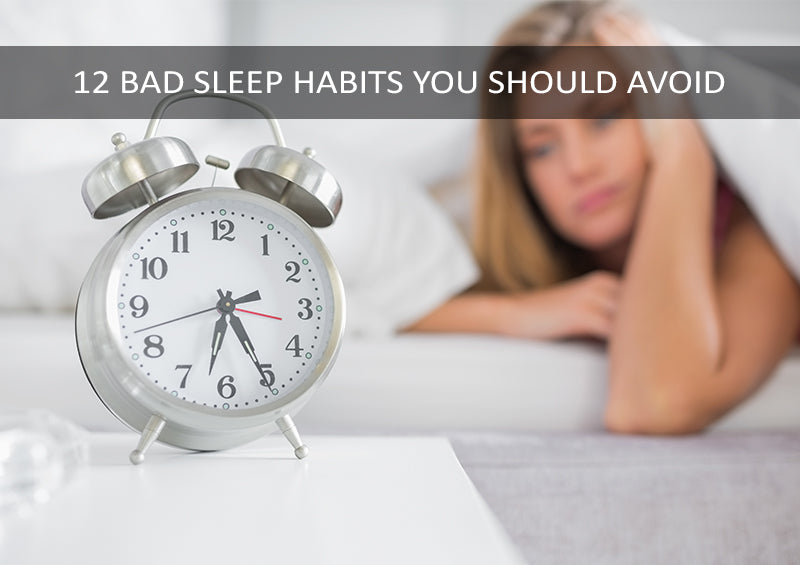In this guide you will find 12 poor sleeping habits that you should be avoiding.
Did you know that 1 in 3 adults aren’t getting enough sleep?
So many are jeopardising their sleep quality for little bad habits that can be easily changed. The role of the Siesta in Style sleep blog is to help you get your routine back on track. That is why a broad range of bad habits are being covered, including:
- The basics – the priorities that you need to deal with first and foremost.
- Before bed – the habits you should be avoiding before bedtime.
- During the night – poor habits you may not realise are affecting you throughout the night.
- In the morning – yes, even when you wake up you could still be affecting the quality of your sleep.
With each habit I will give you the problem, the solution, and how it’s going to benefit your sleep.
First, let me familiarise you with the basics…
The basics
Irregular sleeping hours
It pains me to say it, but those long-awaited lie ins on the weekend aren’t doing your sleep quality any favours.
In fact, they are actually reducing the overall quality.
There are many studies which show a correlation between irregular bed times and poor sleep quality, and there are also links poorer memory retention, decision making and productivity.
Solution: Set regular bed times and stick to them. 10:30pm to 6:30am is a good rough guide, as it follows the natural patterns of sun set and sun rise, but choose whatever is best for you.
Benefit: Improve your concentration, memory, energy levels, mood and you may start waking up naturally (goodbye irritating alarm clock!)
Rigidly sticking to 8 hours sleep
…because that’s what everyone says you need. Yes, it is recommended for some people, but the lovely part of being human is that we’re all different and have our own unique needs.
There’s no one size fits all and most people have a set sleep time that works best for them. Getting too much or not getting enough slumber can be seriously detrimental to your sleep quality.
Solution: Experiment with different times. Perhaps start with a consistent 8 hours every night and evaluate how you feel at the end of the week. Still feel tired? Add on an hour or two. Or, you may want to try a 6 hour routine, as this is the ideal amount for many people.
Benefit: You are the expert and are in control of your sleep. You know exactly how much you need which makes it easier to pinpoint why you may be feeling tired. Not to mention the boost in energy, mood and concentration.
Before bed
Consuming caffeine too close to bedtime
Our beloved caffeinated beverages get us through the morning, but that is where they should stay. Consuming caffeine in the afternoon or too close to bed time can not only make it harder for us to drift off at night, but can also reduce the quality of our sleep.
It’s also important to know that caffeine isn’t just found in tea or coffee, you may also be consuming it in chocolate, ice cream, sweets or soft drinks.
Solution: Cut out the caffeine around 6-7 hours before your bedtime. This is a rough guide as everyone reacts to caffeine differently, and the symptoms may have a longer or shorter effect on you.
Benefit: You will feel more tired in the evening and be able to drift off much easier, as well as benefiting from a higher quality and deeper sleep.
Using technology before bed
Although aimlessly scrolling through Twitter of Facebook seems to make you feel slightly sleepy, it is having the opposite effect on your brain.
Using your phone, or any device that emits blue light, can have harmful effects such as eye damage, interrupting your body clock, suppressing melatonin, preventing you from getting into a deep sleep and making you feel more tired when you wake up.
Solution: Try to stay off your phone for 1 – 2 hours before you go to bed. 2+ hours is ideal, but you may want to start off small and work your way up to a phone-free night routine.
Benefit: You will feel more relaxed when it comes to bedtime. Over time, it will be easier to fall asleep quickly and the quality will improve.
Drinking alcohol before bed
Many enjoy a nightcap as it helps them drift off quicker. It can even help you sleep for longer, so why wouldn’t you indulge in an evening drink to aid with slumber?
Well, these ‘benefits’ are deceiving, and your body certainly isn’t thanking you for a regular tipple before bed. Our bodies have specific cycles when sleeping at night, and alcohol interrupts these cycles which makes us feel tired the next day.
It can also block REM sleep, which is the most restorative cycle.
Solution: Don’t rely on a nightcap to help you drift off. Drinking in moderation is normal, but it shouldn’t be used as a way to help you sleep. If you need help for ways to unwind before bed, take a look at 15 ways to relax before bed
Benefit: Your sleep quality will improve, and you will feel much more alert and energised the next day.
Failing to prepare for the next day
It gets to 10pm and you’re unwinding for bed. You suddenly realise you haven’t prepared anything for tomorrow, and the thought of organising your next day essentials pains you. You decide it can wait until the morning which results in a pre-work panic trying to find a clean shirt.
Solution: If you know you’ll be too tired to prepare for the next day right before bed, do it as soon as you get home from work.
Benefit: You won’t feel anxious about getting ready the next day, so you can feel more relaxed when falling asleep. You could also treat yourself to another 10 minutes in bed in the morning because of the time you’ve saved through organisation.
Skipping the gym
You’re already tired enough, so why would you take up a gym membership?
If you already feel like your energy levels are low, I understand if exercise is the last thing on your mind. But, it could be just the thing you need to fix fatigue.
Studies show that sitting down, over sleeping and physical inactivity have a serious negative impact on our health and sleep quality.
Solution: The National Institutes of Health recommends 150 minutes a week, which equates to 30 minutes a day. Research also indicates that a consistent exercise routine is most beneficial for sleep quality.
Benefit: Improve the quality of your slumber, improve the amount you get and reduce anxiety and stress. Regular exercise can also help with insomnia and sleeping disorders.
Working in your bedroom
Your bedroom is your own tranquil sanctuary, and it can be tempting to spend as much time in there as possible. It’s a relaxing private space, so it makes sense that we enjoy spending time in there.
However, there are certainly some tasks that should be avoided… work being one of them. Working in your bedroom may be more comfortable, but it’s not doing your sleep any favours.
There should only be relaxing associations with your bedroom to promote a calm environment, which is why work should be avoided.
Solution: Find another spot in the house you could work from. If you don’t have an office or spare room, try the dining room or living room. Or if you really want to keep work life and home life separate, use a local cafe or shared working space.
Benefit: You will only have relaxing connotations with your bedroom which will make you feel much calmer when trying to drift off.
During the night
Checking the time
It happens to us all. Tossing and turning through the night, constantly checking the time to see how many hours we have left.
Each time you check you feel a little more panicked. You can’t help but worry about how tired you’re going to feel in the morning. It’s a continuous cycle that needs to stop.
Not only does it create feelings of anxiousness and stress but exposing yourself to blue light is just another factor that will stop you from drifting off.
Solution: Keep your phone on the other side of the room, or at least out of arms reach. Make sure it is face down, so the screen light doesn’t illuminate the whole room.
Benefit: You won’t be tempted to check the time during the night which stops you from panicking at the time and prevents the blue light affecting your sleep.
Setting the wrong room temperature
Do you crank up the heating before bed in fear to feel extra cosy? Or perhaps you skip it all together and keep all windows open to get plenty of fresh air?
Neither are ideal, and there is certainly a happy medium. Body temperature peaks in the evening and drops during the night, so having the wrong room temperature can have a big impact on your sleep.
Solution: 16-18°C (60-65°F) is the ideal room temperature recommended by the Sleep Council. So, make sure to adjust your thermostat to feel the benefits.
Benefit: Your body doesn’t have to work extra hard to achieve the right temperature. You will feel more comfortable, relaxed and sleep quality will improve.
In the morning
Hitting the snooze button
It can be impossible to resist the temptation of another 5, 10, 20 or even 30 minutes in the morning, but it’s time to put a stop to the snooze button.
Your body needs time to prepare for waking up, which is why it’s a good idea to wake up at the same time every day. Once your initial alarm goes off, your brain starts to wake up and prepare for getting up.
That is why you feel groggy and tired when you sleep for another few minutes and wake up to your snoozed alarm. Also, the little sleep you do get whilst snoozing isn’t beneficial or deep sleep, so it won’t help you feel any less tired.
Solution: Resist the snooze button. This is easier said than done, so you may want to put your phone at the other side of the room so you have to get up to turn off your alarm, which hopefully puts you off snoozing and going back to bed. Or, you could get to the root of the problem. Why are you using the snooze button? You may not be getting enough sleep.
Benefit: It makes getting up easier in the long run, you will get more sleep and it will be of higher quality.
Letting in the light
Darkness is incredibly important for sleep and is the key factor that prepares our brains for slumber. Your body’s internal sleep clock adheres to the natural patterns of sun rise and sun set.
During Summer this can be a problem as sun rise becomes earlier and earlier. Unless you’re waking up at 4:30am, the natural light peaking through curtains can be reducing the quality of your sleep (or even wake you up).
Solution: Invest in blackout curtains. They completely block out natural light, creating the perfect dark environment in your bedroom. Blackout curtains are an especially useful investment for those who work night shifts and sleep during the day.
Benefit: Your body’s natural sleep clock is working how it should, which allows you to go through the several cycles of sleep. This improves the quality and allows you to feel more alert and energised when you wake up.
 Free Shipping
Free Shipping
 +44(0)1204 529156
+44(0)1204 529156
 m.ahmad@swliving.co.uk
m.ahmad@swliving.co.uk

